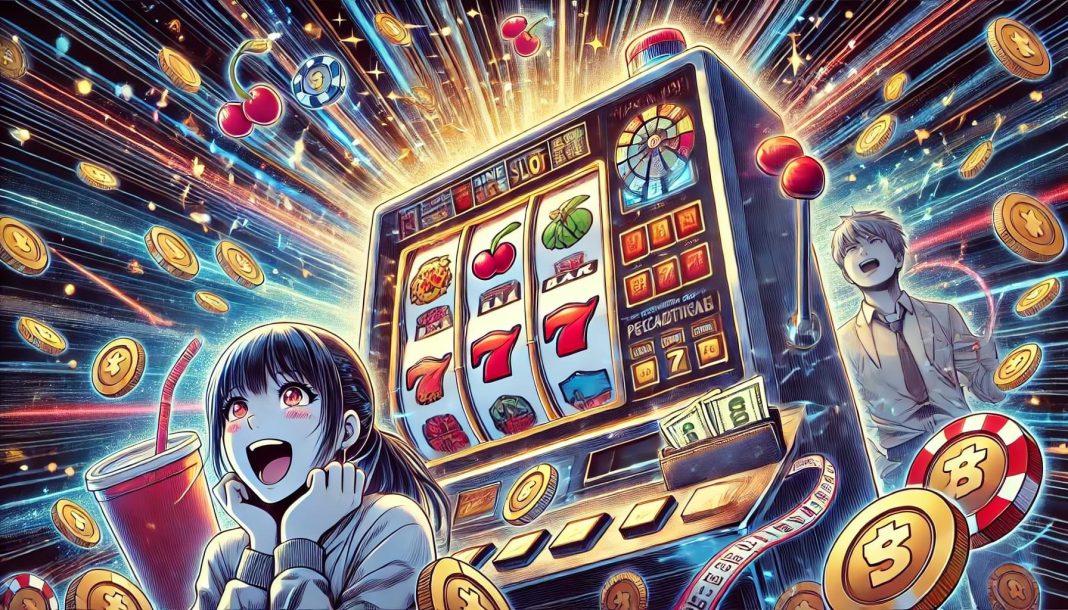Online slots have become a dominant force in the gambling industry, captivating millions with their vibrant graphics, rapid gameplay, and the promise of big wins. But beneath the surface lies a complex interplay of psychological factors that not only draw players in but can lead to addiction.
Leveraging insights from recent studies, this article explores why people play online slots, how addiction develops, and how game developers use this knowledge to keep players spinning.
Why Are Online Slots So Addictive?
Online slots are designed to exploit psychological vulnerabilities, often making players spend more time and money than intended. Understanding the science behind this addiction begins with examining the mechanics of slot gameplay and its impact on the brain.
Instant Gratification and Dopamine Release
Online slots operate on fast, repetitive cycles. Each spin takes seconds, delivering instant results. This rapid feedback loop stimulates the brain’s reward system, releasing dopamine—a neurotransmitter linked to pleasure and motivation.
According to findings in Frontiers in Psychiatry, this constant stimulation creates an emotional high, reinforcing the desire to play more.
The Illusion of Control
Though outcomes are determined by Random Number Generators (RNGs), players often believe their actions—like pressing a button at a specific moment—affect the results. This illusion of control is deeply satisfying and keeps players engaged.
A study from the British Journal of Psychology found that such cognitive distortions are particularly prevalent in mobile gambling, which offers immediate and personalized gambling experiences.
By leveraging insights from research, players can make informed choices, and policymakers can develop effective safeguards to promote responsible gambling.
The Role of Near-Misses in Gambling Behavior
What is called near misses have a special role when it comes to gambling. Here’s how it can contribute to gambling addiction.
What Are Near-Misses?
Near-misses occur when a slot result is close to a win, such as when two matching symbols appear, but the third just misses. These outcomes are psychologically powerful.
The above-mentioned research published in Frontiers in Psychiatry reveals that near-misses activate the same brain regions as actual wins, tricking players into believing they are closer to success than they are.
How Near-Misses Fuel Addiction
Near-misses exploit a player’s cognitive biases, such as the illusion of control and the gambler’s fallacy (believing a win is “due” after a series of losses). The physiological responses—like increased heart rate and skin conductance—further reinforce the urge to continue playing.
These effects make near-misses a cornerstone of slot design, ensuring players remain engaged.
Personality Traits Linked to Gambling Addiction
Not everyone who plays online slots becomes addicted. Research highlights that certain personality traits increase susceptibility to problem gambling.
High Risk Traits
Another longitudinal study from Frontiers in Psychology identified neuroticism (tendency to experience negative emotions) as a strong predictor of gambling problems. Conversely, traits like conscientiousness and agreeableness were found to have protective effects.
Escapism and Emotional Coping
Many individuals use gambling as a coping mechanism for stress, anxiety, or boredom. While gambling temporarily alleviates negative emotions, it often exacerbates underlying issues, creating a vicious cycle.
How Developers Use Psychology to Keep Players Playing
Game developers and online casinos are acutely aware of the psychological principles that drive player behavior. Using data analytics, A/B testing, and behavioral science, they refine games to maximize engagement and revenue.
Features Designed to Hook Players
- Near-Misses: Near-miss outcomes—e.g., two matching symbols with the third just one spot away—trigger the same parts of the brain as actual wins, encouraging players to try again.
- Variable Betting Options: Allowing players to choose bet sizes creates a false sense of control, making them feel they can influence outcomes.
- Free Spins and Bonuses: Offering bonuses or free spins keeps players engaged longer and fosters a sense of loyalty to the platform.
- Loyalty Programs: VIP tiers, rewards, and leaderboards exploit the human desire for status and achievement, encouraging players to spend more to “level up.”
Personalization and Big Data
Modern casinos analyze player behavior to tailor experiences. Personalized recommendations, targeted bonuses, and dynamic adjustments to game difficulty keep players hooked.
Ethical Concerns and Responsible Gambling
The strategies used to enhance engagement also raise ethical questions. While these features make gambling entertaining, they can lead to addiction in vulnerable populations.
The Need for Safeguards
Some jurisdictions have implemented measures like betting limits, self-exclusion programs, and mandatory breaks to mitigate harm.
However, the effectiveness of these interventions varies, and further innovation is needed to address the risks associated with online gambling.
Tips for Responsible Gambling:
- Set Time and Money Limits: Decide in advance how much you’re willing to spend and how long you’ll play.
- Recognize Triggers: Be aware of emotional states that might lead you to gamble impulsively.
- Use Casino Tools: Many online casinos offer tools like self-exclusion, spending limits, or session reminders.
Conclusion
The psychology behind online slots is a testament to the industry’s understanding of human behavior. While these games provide entertainment for many, they also pose significant risks for others.
By leveraging insights from research, players can make informed choices, and policymakers can develop effective safeguards to promote responsible gambling.




